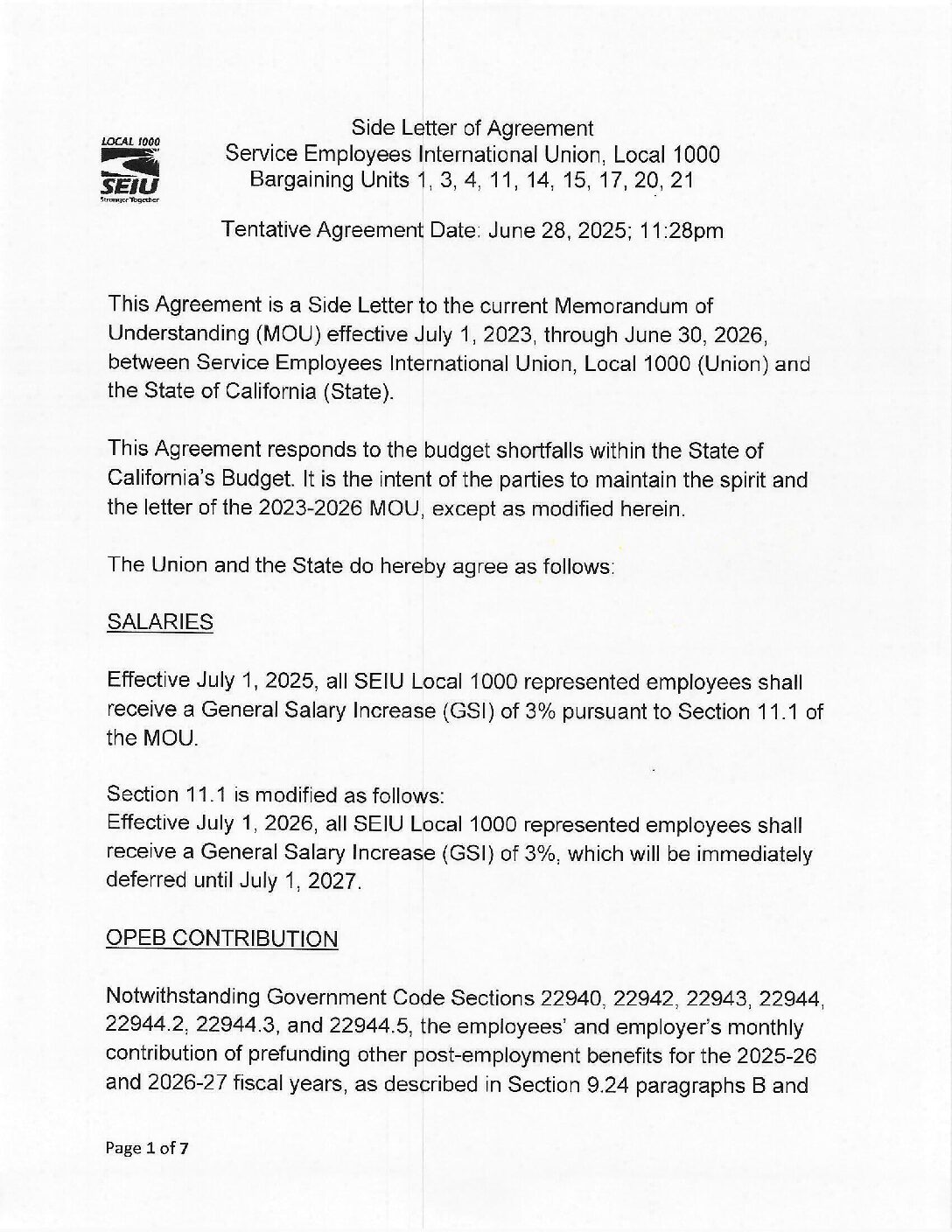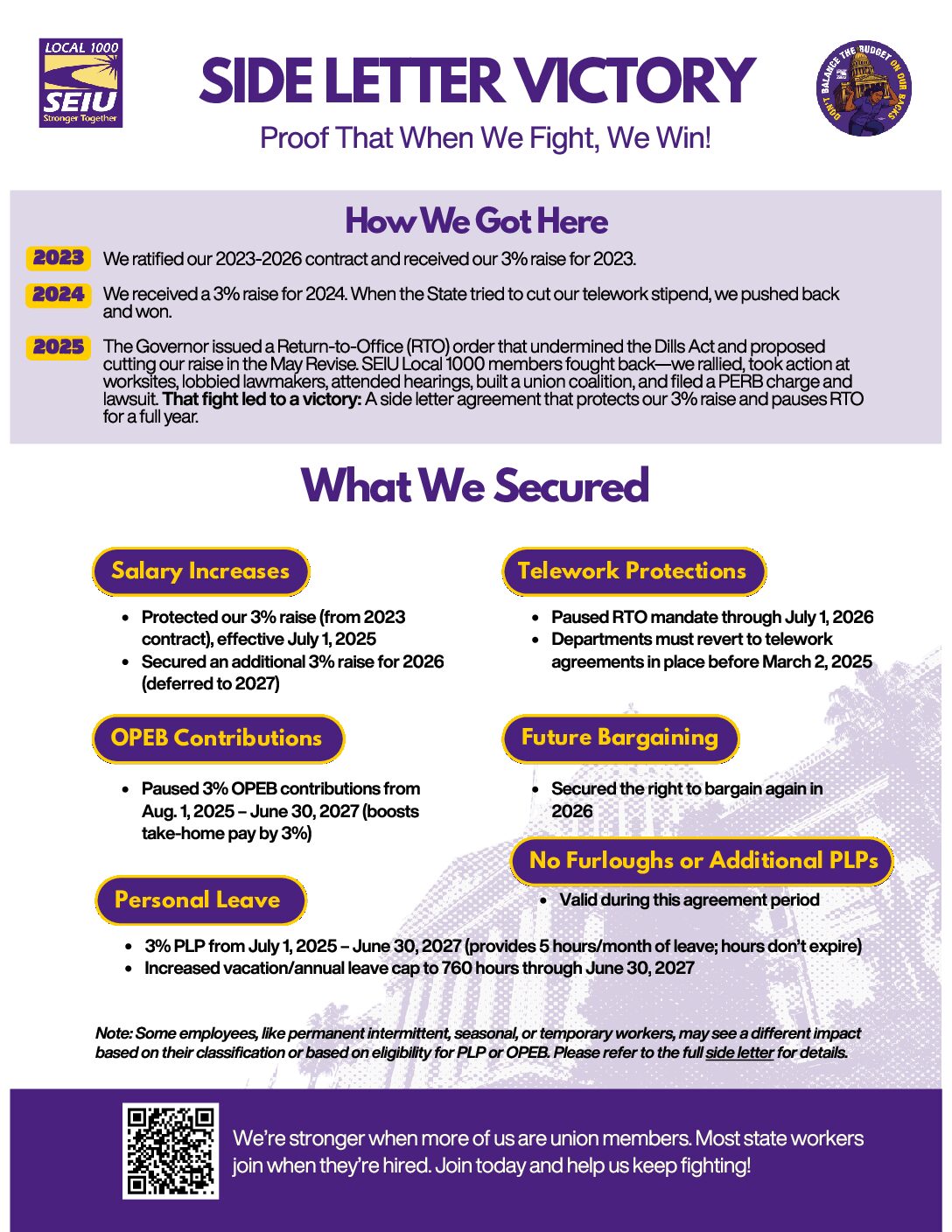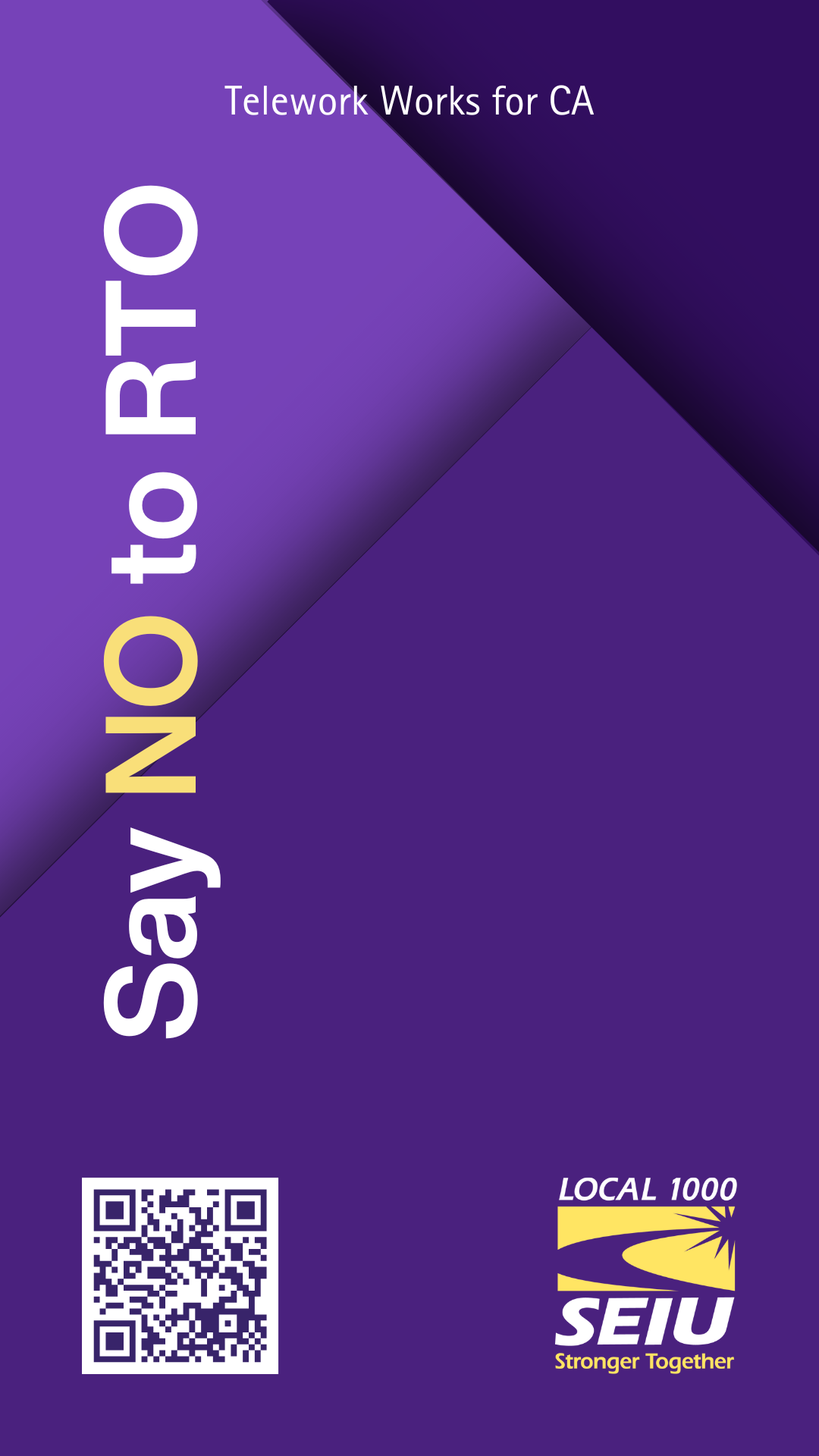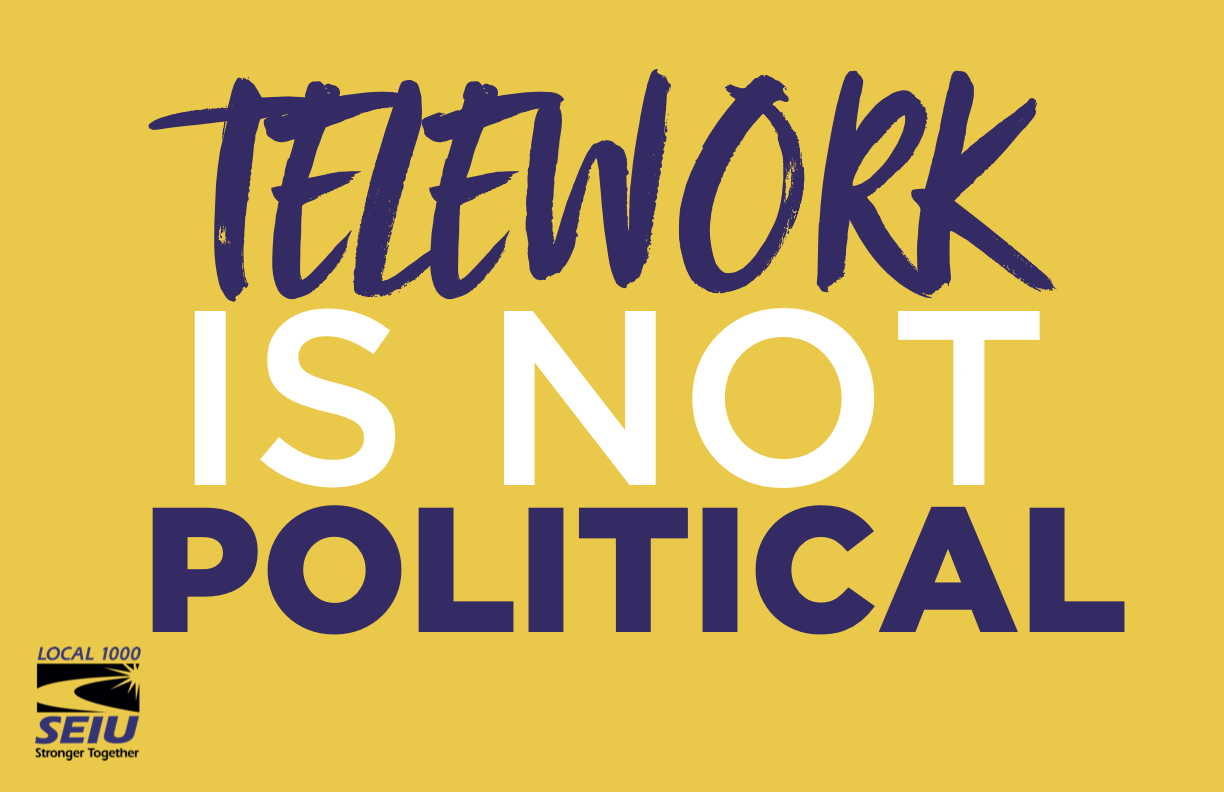
SEIU Local 1000’s fight against Governor Newsom’s Return-to-Office Mandate
“The California State Auditor’s new telework report confirms what we’ve been saying all along: telework works. It saves the State hundreds of millions of dollars, reduces traffic and pollution, and helps recruit and retain the best workers. In the most comprehensive survey of its kind, both rank-and-file and management agreed: telework improves work-life balance, cuts costs, strengthens recruitment and retention, and doesn’t hurt productivity or customer service.
We thank Assemblymember Josh Hoover for calling for this audit, which makes clear what’s at stake for taxpayers and state workers. That’s why we’re calling on the Legislature to reclaim control of telework policy and require departments to maximize telework where it works best.”
When We Fight, We Win!
Our SEIU Local 1000 bargaining team reached a side letter of agreement with the state that pauses RTO through July 1, 2026. Read the full details below:
Break Down of Our Side Letter Wins
Check out the victories we secured through our latest side letter agreement. These wins are a direct result of member action and unity. Download and print our flyer to distribute to your coworkers! We’re stronger when we’re informed!
Side Letter of Agreement – Frequently Asked Questions
1. My department is still requiring me to come into the office even after this agreement. Is that allowed? What can I do?
2. Can departments force employees, including those hired under 100% telework agreements, back to the office on day 91?
No. The Governor’s 4-day RTO mandate is delayed for at least a full year — until July 1, 2026. During the first 90 days after the agreement’s ratification, departments are completely blocked from making any new telework changes. After that, they must provide 30 days’ formal notice and meet-and-confer with the union before implementing any changes.
3. Why was the California Highway Patrol (CHP) excluded from the RTO suspension?
4. Will we have to fight RTO all over again after the 90-day pause?
Display Your Support for Telework on Zoom and Teams Calls!
Every time you use this background, you’re sending a powerful message: State workers have proven hybrid work works. It’s an easy, impactful way to show solidarity and raise awareness about the importance of continuing telework for California’s workforce.
Download Printable Flyers to Support Telework at Your Worksite
Download and print our Telework Works for CA flyers to post on bulletin boards, bring to union events, or use during worksite actions. It’s a simple, visible way to show solidarity and remind others that hybrid work works.

Our Fight Against CHP’s RTO Policy
August 25, 2025
On July 8, 2025, SEIU Local 1000 issued a cease-and-desist to CHP regarding its decision to unilaterally require employees back into office five days a week. Despite this, CHP has continued with their RTO policy.
In response, our legal team filed an Unfair Practice Charge (ULP) with the Public Employment Relations Board (PERB) on August 25, 2025. We are committed to fighting for our members and will provide updates as the process moves forward.
We Took Action Against CHP
July 8, 2025
On Monday, we filed a cease and desist letter with the California Highway Patrol (CHP) and requested a formal meeting. We fought to make sure the return-to-office (RTO) pause applied to all SEIU Local 1000-represented departments, but the State forced us to leave CHP out. That’s why we took action and why we’ll keep fighting to protect telework and stand up for our members.
If you work at CHP, get involved. Become a job steward. The more of us who are informed and can take action, the more power we have to win!
Bargaining Agreement Reached: RTO Paused
June 29, 2025
We’ve reached an agreement with the State that protects your raise, pauses the return to office order, and gives us a path to bargain again in 2026.
Earlier this year, Governor Newsom and the State Legislature asked all unions to return to the table to address the state’s budget crisis. When they canceled our negotiated raise, SEIU Local 1000 pushed back. Through tough negotiations, we secured an agreement that defends what we won and limits the impact on workers.
Legal Action Against the Governor and CalHR
June 20, 2025
Today, on behalf of affected state employees, SEIU Local 1000 and President Anica Walls filed a lawsuit against Governor Gavin Newsom and the California Department of Human Resources (CalHR), challenging the legality of the Governor’s Return-to-Office (RTO) mandate that forces most state employees back into physical offices at least four days per week starting July 1, 2025.
This legal filing, known as a writ of mandate, was submitted in Alameda Superior Court and argues that the Governor’s order violates state law and the Administrative Procedure Act (APA) by imposing a major workplace policy—an illegal “underground regulation”—without legal authority, public input, or notice to our Union.
“This is not just about office attendance—it’s about transparency, accountability, and respect for the law,” said President Walls. “State workers successfully transitioned to telework during the pandemic, saving taxpayer dollars, reducing pollution, and improving service delivery. The Governor is now attempting to undo that progress behind closed doors and with unilateral action.”
Over the past several years, state departments have reduced office space and adapted to hybrid work, saving the state at least $700 million. Our filing highlights the enormous new costs it would take to reverse that shift—potentially costing taxpayers hundreds of millions of dollars each year—costs that were never considered in the state budget or legislative process.
We’re doing everything we can to protect the rights, health, and financial security of all the state employees we represent. This fight for fair and legal working conditions isn’t over. We’re demanding accountability—not empty promises—and we will keep pushing back against any effort to ignore the democratic process or silence our voices.
Next Stop — Formal PERB Hearing
June 19, 2025
After unsuccessful attempts to reverse the state’s decision through required settlement talks, Local 1000 is moving forward with a full evidentiary hearing to challenge the State’s unilateral imposition of a mandatory four-day Return-to-Office (RTO) policy.
Continue Reading...
During the settlement meeting, our Union called on the Governor to rescind the RTO mandate, arguing it was imposed in violation of the Dills Act — the law that protects our right to bargain over changes to working conditions. Local 1000 maintains that the order was issued without proper consultation or good-faith bargaining, overstepping what the State is legally allowed to do.
We’re committed to defending our members’ rights and the integrity of the bargaining process.
“Our position is simple: the State cannot disregard its duty to negotiate over matters that directly impact employees’ working conditions,” said President Walls. “We didn’t pick this fight, but we won’t back down from it either.”
The case now heads to a full evidentiary hearing before the Public Employment Relations Board (PERB), where the facts will be presented and a legal decision made.
PERB Conference on Thursday, June 19th
June 18, 2025
SEIU Local 1000 will appear before the Public Employment Relations Board (PERB) to fight back against the Governor’s Return-to-Office (RTO) mandate.
Continue Reading...
We filed an unfair practice complaint after the State unilaterally announced a major change to telework policy—without properly notifying our Union or giving us the chance to meet and confer, as required by our contract. The Executive Order mandating four in-person workdays per week violates the Dill’s Act, which protects our right to bargain and ensures existing telework agreements stay in place unless negotiated. This informal conference is a critical step in our legal fight to protect your telework rights.
California Department of Education (CDE) Reverses Course on RTO Mandate
June 9, 2025
Per Superintendent Thurmond, the California Department of Education (CDE) is NOT going back to the office four days per week!
PERB Issues Complaint in Response to SEIU Local 1000’s Unfair Practice Charge (UPC) Regarding the RTO Mandate
May 13, 2025
SEIU Local 1000 Files Legal Action to Challenge the RTO Mandate
March 3, 2025
Yesterday, SEIU Local 1000 officially filed an Unfair Practice Charge (UPC) with the Public Employment Relations Board (PERB), standing together with PECG workers in taking legal action against the Governor’s executive order on return to office. Read the full filing here.
Continue Reading...
This filing is a direct challenge to an unlawful mandate that violates our members’ collective bargaining rights under the Dills Act and disregards our contract. The Governor imposed this order unilaterally, without negotiation, without consideration for its impact on state workers, and without following the law.
We’re demanding that PERB rescind this illegal order immediately and return decision-making on telework and return-to-office policies back to individual departments, where it belongs. Agencies should be making operational decisions based on business needs – not political mandates.
Contact the Member Resource Center
If you believe you might qualify for a reasonable accommodation, start by contacting your department lead—this could be your first-line supervisor, personnel specialist, or HR department. They can provide details on your department’s return-to-work policies and the process for requesting accommodations. Once you have your department’s reasonable accommodation policy and telework agreement, contact the Member Resource Center (MRC) for guidance.
📞 Call: (866) 471-7348
🕒 Hours: Monday – Friday, 7 a.m. – 7 p.m.
The MRC can help you understand your options and navigate the request process.















Telework was not only useful during the pandemic. Its benefits are endless; saves us high gas costs, minimizes toxic air pollution, rent costs for state offices, parking fees for employees, time spent driving in overcrowded freeways/streets, etc. It defeats the purpose of having city-funded e-bikes, scooters, e-vehicles that supposedly were meant to preserve the environment and yet we are now back to work everyday en masse. Why is the system contradicting its own efforts to preserve our environment?
I can’t believe they want us to RTO where we would spend so much more on gas but slash our raise in this greatly inflated economy. That’s also contradicting and hurts our wallet.
Well said. Our department heads should deny this order.
We are in a situation where our signed 4% raise is at risk and we might not get it. On top of that, they are rumors on pay cuts.
Working in downtown, we need to pay 16+ dollars for parking per day with 4 days in office, it would cost around 350 per month for parking.
Sending to daycare during non school days is 1500 per month per kid, and this amount is for the daycare that is in public school. And schools are closed for more days than the vacation hrs provided for us.
With theft and fire disasters in California, car and home insurance went up. And, so is the cost of living with inflation. When we add the commute mileage, we are not just paying for the gas but also higher car insurance.
If we have 2 or more younger kids, with gas cost,increased insurance, time for travel (almost 2-3 hrs a day with never ending Freeway 50 construction), daycare, parking, pay cuts, no raises, unable to take them to extra curricular activities, I wonder as a mom if I am discouraged to work and stay at home. We had good collaboration, teamwork when we worked 100% remote. With all this extra cost for coming to work, I feel what business we want to encourage or help in downtown that is costing me these extra money apart from ofc spaces and parking.
With these additional expenses, forget about downtown, will I be able to spend money at my local restaurants and encourage local businesses.
RTO saves time. The time we spend for traveling and co2 emissions…we can protect environment and utilize that travel time taking care of health by going to gym. Or to take kids to extra activities which not only helps kids but also make better future Californians.
Please thing about productivity and wellness of stateworkers. And provide RTO for employees not extra burden.
RTO making cost of living higher. will spend more time in commute spend extra money on breakfast and lunch. spent more money on parking fee gas money. I dont see is productive going to office 4 days a week.
I Agree with members, Telework was not only useful during the pandemic. Its benefits are endless; saves us high gas costs, minimizes toxic air pollution, rent costs for state offices, parking fees for employees, time spent driving in overcrowded freeways/streets, etc. It defeats the purpose of having city-funded e-bikes, scooters, e-vehicles that supposedly were meant to preserve the environment and yet we are now back to work everyday end masse. Why is the system contradicting its own efforts to preserve our environment?
We will not, per Newsom’s public discussion on this topic, be able to help keep the downtown Sacramento economy alive while having to pay for the time, food, gas/commuting, childcare, and parking costs of RTO. The local economy in Sacramento has inflated significantly since 2008 and the only reason the State has maintained any kind of employee retention in the last few years has been due to the Telework Policy. State Pay hasn’t kept pace with the cost of living increases. The Federal Staff that Newsom hopes to inherit to replace the current State staff do not live in California and they will not move here due to the expense. It’s time for the Directors of these State Agencies to take a stand with us! Please say no to RTO. If you don’t say “no” for our sake, then consider saying “no” for yours. In RTO, the size of the State Government will shrink for the first time in decades and the current management class will be forced into Department mergers, reduced rank, furloughs, early retirement, and lower pay. The staffing issues the State has now will increase exponentially and many of your roles will not be justifiable for much longer.
I work for EDD as a Employment Program Representative for Unemployment Insurance Department ARU 019 Anaheim. I reside 65 miles from my office. I want to continue Tele-Working 3 out 4 weeks at home. This has been a challenge even coming in one week a month. I don’t see how it is productive to spend up to 5 hours a day commuting everyday. It takes away the possibility for overtime work. The expenses and exhaustion physically make it hard to keep up.They have proven how well our Department does Tele-Working. I vote to be allowed to continue as we are/ were during the pandemic.
we are being mandated to return to office by our office management on July 1, 2025. is there anything else we can do since PERB has filed complaint.
The decision to require state employees to return to the office four days per week starting July 1 is abrupt, unnecessary, and disruptive. It ignores the success of telework over the past several years and imposes new hardships on employees without justification or input.
This is a jarring, uprooting change—and it’s not right to impose it this way.
State employees adapted, delivered, and kept the wheels of government turning under telework. To now reverse that progress without discussion or transition is unfair and out of step with the realities of modern work.
1. The Commute Is a Setback
Traffic is already a major problem in California—this will only make it worse.
Gas prices remain high. Forcing daily commutes means employees shoulder that cost with no compensation.
More driving means more wear and tear on vehicles and more lost hours every week—time that could be spent working or caring for family.
2. It Creates Financial and Mental Strain
This mandate effectively cuts into take-home pay with added costs: gas, food, parking, and possibly childcare.
The mental and emotional stress of daily commutes disrupted routines, and rushed mornings harms productivity and morale.
Many employees feel this decision was made without consideration of their needs or voices.
3. Telework Has Worked—Why Undo It?
Productivity has remained strong—or even improved—while working remotely.
Performance metrics haven’t suffered. In many departments, they’ve improved.
Mandating a return sends the wrong message: that success from home isn’t trusted or valued.
4. There’s a Smarter Way Forward
Offer flexibility. Let those who want to return do so, while keeping telework an option for others.
A hybrid model—1–2 days in the office—is a fair middle ground.
Major decisions like this should be guided by employee feedback and real data, not top-down mandates.
In Closing
This mandate doesn’t support the workforce—it disrupts it. Telework isn’t a perk. It’s a proven tool for effective, efficient, and humane government service. We urge leadership to pause, engage with employees, and move forward in a way that reflects both the realities of today and the success we’ve built together.
Respectfully,
Anonymous State Employee
Newsom just confirmed his commitment to funding Electric Vehicles (EV) and EV infrastructure projects, including the High Speed Rail project that is ongoing in the Central Valley. So, it makes no sense to have more gasoline powered vehicles on the highways contributing more greenhouse gas emissions and congestion to the Sacramento Valley. In addition, the additional traffic will create more road maintenance, which is more money the state will need to pay. It makes no sense to make state workers return to the office four days a week.
Telework helps to reduce the cost of leasing, utilities and maintenance. Also, it helps to reduces commuting, which lowers greenhouse gas emissions and traffic congestion- aligning with our state goals! Allowing telework can lead to improved morale and better service to public.
During the pandemic office leases were not renewed for our agency field offices.
DGS looked for and signed leases for smaller offices spaces for our employees. In one example, 25 people report to a field office on Monday and Tuesday, and a different 25 people report to that office on Wednesday, and Thursday, now 50 people must report to that office 4 days a week. The current office does not have enough desks, chairs, and network connections to accommodate 50 people at one time.
Our agency spent money to move out of the large office space and build out the smaller office space for 25 people. I doubt that putting 50 people in a space that was intended for 25 would pass the fire code.
Now DGS is going to have to spend more money to break the lease of the small office space and find these people a larger space which will cost more money. There will be another cost to pay for the moving and the build out of another large office space. This agency has 20 California field offices and 3 out of state field offices. Some offices have over 100 people assigned to one office.
Some people have moved further away from their assigned field office in order to lessen their cost of living.
Going back to the office 4 days a week does not improve the work environment. Employees do not utilize the conference rooms. Employees stay at their desk and have a conference call on MS Teams and someone shares their computer screen. Even if those people all sit within 20 feet of each other. We can do the same thing from home. Production has not suffered. Work is getting done just as efficiently as before. Continual changes in technology and the work flow process have actually allowed efficiency to improve, but not because people were in the office.
This is a wasteful use of my tax dollars. The governor and the legislature and state agencies in general should keep costs in mind in an effort to ensure that they are good stewards of state funds.
As a native Califonian, resident and now State of California employee of 10 years, I have had the privilege of working with people that have encouraged work-life flexibility. I have worked under two governors that, at one point, were huge proponents of making telework a reality. The pandemic was a horrible misfortune, but it gave birth to the reality that working from home gives employees more morale, production and a deeper appreciation for what they do and the people they serve. California is and has always been a melting pot of change, innovation and ideas that not only help the State, but also gives people the freedom to do their work in a manner which provides more indepence. Also, as State employees, our hard work should not come at the cost of a 3% salary increase which will not go to us. Instead, it will feed gas tanks, B.A.R.T. fares, Fastrak transponders and expenses that come with going to the office more. In this climate, that defeats the purpose of getting what we deserve to enjoy. The 3% should not be a driver to keeping our already working schedules. By going back on something that has proven successful over the last 5 years, it goes against what California stands for, and what SEIU fights diligently to uphold. TELEWORK WORKS!
As a native Californian, resident and now State of California employee of 10 years, I have had the privilege of working with people that have encouraged work-life flexibility. I have worked under two governors that, at one point, were huge proponents of making telework a reality. The pandemic was a horrible misfortune, but it gave birth to the reality that working from home gives employees more morale, production and a deeper appreciation for what they do and the people they serve. California is and has always been a melting pot of change, innovation and ideas that not only help the State, but also gives people the freedom to do their work in a manner which provides more independence. Also, as State employees, our hard work should not come at the cost of a 3% salary increase which will not go to us. Instead, it will feed gas tanks, B.A.R.T. fares, Fastrak transponders and expenses that come with going to the office more. In this climate, that defeats the purpose of getting what we deserve to enjoy. The 3% should not be a driver to keeping our already working schedules. By going back on something that has proven successful over the last 5 years, it goes against what California stands for, and what SEIU fights diligently to uphold. TELEWORK WORKS!
Why can’t the governor allow his deputy’s the ability to determine what is best for their own workforce? Some state jobs require in person attendance by many DO NOT. Maybe make it so that new employees have to work for a unit for a year (like to qualify for RDO) before teleworking or if units are not being productive then bring the employees back in. Allow staff that want to come in to the office to do (some people want to go in to the office). But if it is working, and productivity is up and there is no “need to spark creativity” at least where I work because if you ask a state worker why they do things the way they do they will always almost answer, “because that’s the way we have done it for the last twenty (sometimes thirty) years” and if you try to propose improvements to processes, trust me, you are all but committing career suicide. State managers do not like change. My job, in procurement, is dictated by legislation and all I do is take paperwork and put it in the right order, check for compliance, and submit for signature…no need to come into the office, travel at least one hour each way and lose at a minimum of three hours a day for a minimum of 15 hours a week I could be spending with my family and not just riding lightrail with the homeless and being subjected to possible illness. Some people need to go in the office, make their commute easier by not having all of us who do not need to be out there making their lives even more difficult. This is madness…telework was an option that was supposed to be allowed when able prior to Covid and now that we know we can do it…the Governor takes it away. Can only hope the new Governor sees how stupid this is. Definitely not going to vote for this idiot.
When I teleworked full time during the pandemic, the relatively smog free sky reminded me of my childhood. Even with the current in office schedule the smog has worsened. More drivers are on the road because more people are moving here and commuting. Although the smog is not as bad as it is in the Inland Empire, the current smog in Sacramento reminds me of it. The Governor’s RTO will increase smog and other pollution which is bad for health and the environment.